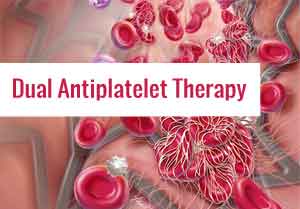- Home
- Editorial
- News
- Practice Guidelines
- Anesthesiology Guidelines
- Cancer Guidelines
- Cardiac Sciences Guidelines
- Critical Care Guidelines
- Dentistry Guidelines
- Dermatology Guidelines
- Diabetes and Endo Guidelines
- Diagnostics Guidelines
- ENT Guidelines
- Featured Practice Guidelines
- Gastroenterology Guidelines
- Geriatrics Guidelines
- Medicine Guidelines
- Nephrology Guidelines
- Neurosciences Guidelines
- Obs and Gynae Guidelines
- Ophthalmology Guidelines
- Orthopaedics Guidelines
- Paediatrics Guidelines
- Psychiatry Guidelines
- Pulmonology Guidelines
- Radiology Guidelines
- Surgery Guidelines
- Urology Guidelines
Initiate DAPT within 24 hours of minor stroke or TIA For maximum benefit: JAMA Study

Delhi: The benefit of dual antiplatelet therapy (Clopidogrel-aspirin treatment) is confined to 21 days after minor ischemic stroke or high-risk transient ischemic attack (TIA), shows pooled analysis of two trials -- CHANCE and POINT.
According to the results of the study published in the JAMA Neurology journal, the therapy should be started within 24 hours of minor ischemic stroke or high-risk TIA and continued for 21 days.
"Clopidogrel-aspirin treatment started quickly reduced the risk of major ischemic events over 90 days compared with aspirin alone (6.5% vs 9.1%), but the effect was mainly within the first 21 days," the researchers reported.
Dual antiplatelet therapy with clopidogrel and aspirin is effective for secondary prevention after minor ischemic stroke or TIA. The optimal duration of dual antiplatelet therapy for minor stroke or TIA is not exactly defined.
Yuesong Pan, Department of Neurology, Beijing Tiantan Hospital, Capital Medical University, Beijing, China, and colleagues conducted the study to obtain precise estimates of efficacy and risk of dual antiplatelet therapy after minor ischemic stroke or TIA.
The study included data from CHANCE and POINT trials. CHANCE is a trial conducted at 114 sites in China from 2009 to 2012, and POINT is a study at 269 international sites from 2010 to 2017. Both were double-blind randomized trials of minor ischemic stroke (National Institutes of Health Stroke Scale [NIHSS] of ≤3) or high-risk TIA (ABCD -- age, blood pressure, clinical features, duration of symptoms, and presence of diabetes -- score of ≥4) patients.
In the 2 trials, patients with minor stroke or high-risk TIA were randomized to clopidogrel-aspirin or aspirin alone within 12 hours (POINT) or 24 hours (CHANCE) of symptom onset.
The median age in the study was 63 and 61% were men; most participants (65%) had a minor stroke as the qualifying event. In total, 5,016 patients were assigned clopidogrel and aspirin and 5,035 were assigned aspirin alone.
The primary efficacy outcome was a major ischemic event (ischemic stroke, myocardial infarction, or death from ischemic vascular causes). The primary safety outcome was major hemorrhage.
Key findings include:
- Clopidogrel-aspirin treatment reduced the risk of major ischemic events at 90 days compared with aspirin alone (328 of 5016 [6.5%] vs 458 of 5035 [9.1%]), mainly within the first 21 days (263 of 5016 [5.2%] vs 391 of 5035 [7.8%]), but not from day 22 to day 90.
- No evidence of heterogeneity of treatment outcome across trials or prespecified subgroups was observed.
- Major hemorrhages were more frequent in the clopidogrel-aspirin group, but the difference was nonsignificant.
The bottom line of the study is -- in patients with acute minor stroke or transient ischemic attack, dual antiplatelet therapy should be initiated as soon as possible, but preferably within 24 hours after symptom onset, and continued for a duration of 21 days.
To read the complete study log on to doi:10.1001/jamaneurol.2019.2531

Disclaimer: This site is primarily intended for healthcare professionals. Any content/information on this website does not replace the advice of medical and/or health professionals and should not be construed as medical/diagnostic advice/endorsement or prescription. Use of this site is subject to our terms of use, privacy policy, advertisement policy. © 2020 Minerva Medical Treatment Pvt Ltd